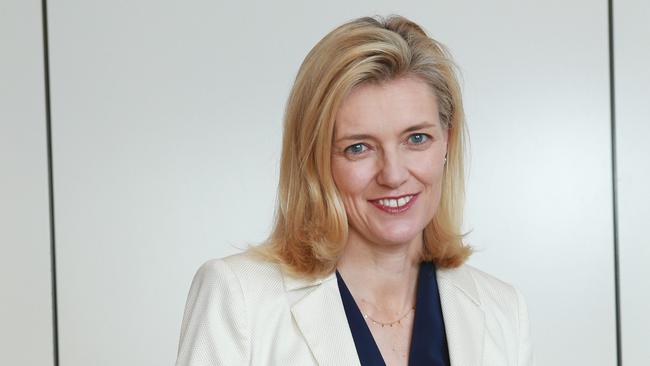Gender diversity quotas a recipe for disaster
The corporate sector’s obsession with diversity has failed, and parachuting more women into powerful positions is more likely to cause conflict than create an ethical nirvana, writes Miranda Devine.
Rendezview
Don't miss out on the headlines from Rendezview. Followed categories will be added to My News.
THE obsession with diversity in corporate Australia has now had a decade to prove itself.
The results show the experiment has been an abject failure.
Turns out diversity is not strength, after all.
Parachuting more women onto boards, whether via diversity quotas or “targets” has not led, as promised, to a nirvana of more ethical, socially responsible corporations.
You only have to look at the revelations from the banking royal commission to see how it’s panned out.
Take AMP, the very model of gender diversity. Half its independent directors are women, including chairman Catherine Brenner, a protégé of socially progressive businessman David Gonski.
Brenner resigned this week, her glittering career at AMP in tatters, after the company admitted to charging customers for services they didn’t receive and misleading the corporate regulator ASIC.
How different might it have been for Brenner had she followed a conventionally slower trajectory into the exalted role which pays $660,000 for 14 board meetings a year.
She won’t starve as she still has gigs as a non-executive director on the boards of Coca-Cola Amatil ($254,388) and Boral ($182,300).
Nice work if you can get it, but Brenner’s very public crash and burn is bad for women and should make us push back against the increasing pressure for diversity for its own sake.
Boards are not playthings for social engineers. They are the backbone of corporate morality.

The obsession with corporate diversity can be traced back to 2007 when management consultants McKinsey & Company released a report, “Women Matter”, which claimed the “elevated presence of women in the workplace” would boost corporate performance. “Diversity is strength” has been the Orwellian mantra for Australian business ever since. Every large organisation, from AMP to Google, from the Australian Army to the Human Rights Commission, is an evangelist.
McKinsey has since expanded its notion of diversity to include “race, ethnicity and sexual orientation as well as gender.” Its diversity reports are cited by HR departments everywhere to justify the intuitively bad practice of promoting people, not on merit, but on involuntary attributes such as sex, race or sexuality.
AMP was a diversity zealot. In a 2016 paper, its senior manager of corporate governance, Karin Halliday, wrote: “Research shows that when women are added to decision-making groups, the groups are likely to have increased focus on ethics, risk management, reputation and co-operation”.
Well, the research shows no such thing. In fact, far from being a source of strength, diversity is more likely to be a source of conflict in the workplace.
A literature review of 40 years of diversity research by Katherine Williams of Columbia University and Charles O’Reilly of Stanford University in the Journal of Research in Organizational Behavior concluded: “The preponderance of empirical evidence suggests that diversity is most likely to impede group functioning. Unless steps are taken to actively counteract these effects the evidence suggests that, by itself, diversity is more likely to have negative effects than positive effects on group performance. Simply having more diversity in a group is no guarantee that the group will make better decisions or function effectively.”
In another paper “The Paradox of Diversity Management, Creativity and Innovation”, in the Journal of Creativity and Innovation Management, Nigel Bassett‐Jones of Oxford-Brookes University, writes that diversity can cause “misunderstanding, suspicion and conflict in the workplace that can result in absenteeism, poor quality, low morale and loss of competitiveness.”
The research backs what we understand instinctively. Artificial diversity quotas are inherently flawed. They rig the system and everyone knows it, even if they can’t say so. Human nature dictates that the players adjust their behaviour accordingly if they want to win the game. If you are not rewarded on merit, then merit is devalued.
The only guarantee is that, if a woman is placed in a role that should have gone to a more qualified man, then both winner and loser are diminished. And if a qualified woman is appointed in such a system, her elevation automatically is viewed with suspicion and her genuine achievements delegitimised.
The man who has followed the rules to get to the top only to find the fix is in feels justifiably aggrieved and either quits or sets out to get even. The woman who accepts a role she has not earned and does not have the knowledge to carry it out must either lie to herself or knowingly participate in a corrupt process. Other women who have played by the rules will realise they are wasting their time trying to achieve on merit and will either quit the game or network themselves into the bogus diversity fast track.
It goes without saying that diversity voodoo is a recipe for disaster, not just for the individual company but ultimately for capitalist economies.
Democracy and the markets are not just machines that run by themselves, as American theologian George Weigel says. They need a critical mass of moral people who are “possessed of certain virtues” and “certain habits of mind and heart”, such as self-discipline, industriousness, the capacity for prudent risk-taking and, above all, honesty.
Obviously, honest people will not flourish in a flawed ‘diversity’ system.
In the end, you reap what you sow, and the banks royal commission is giving us a hint of what that looks like.
Tune in to Miranda Live at 4pm today, dailytelegraph.com.au, to hear special guest Jennifer Westacott, Chief Executive of the Business Council of Australia.
devinemiranda@hotmail.com



